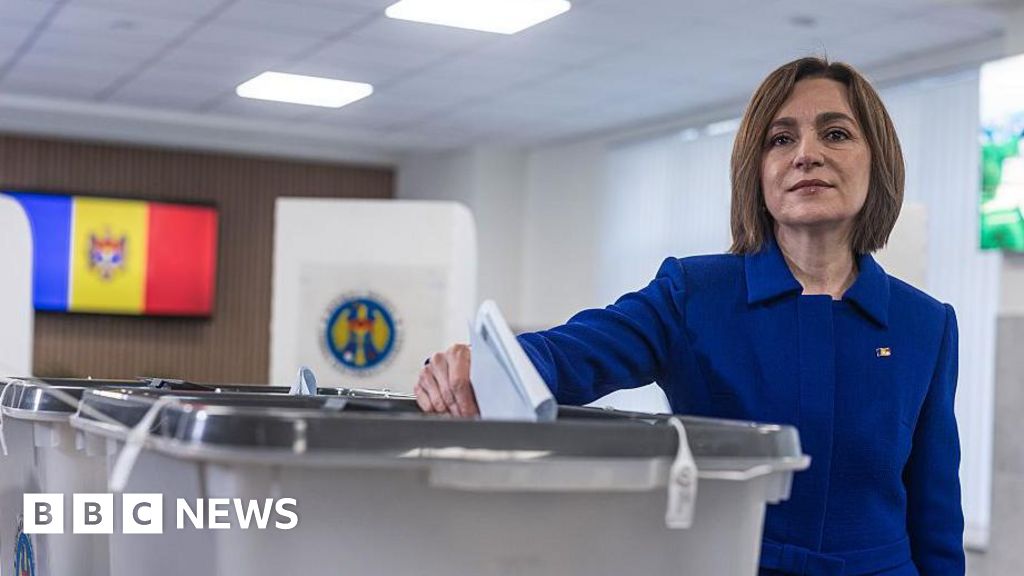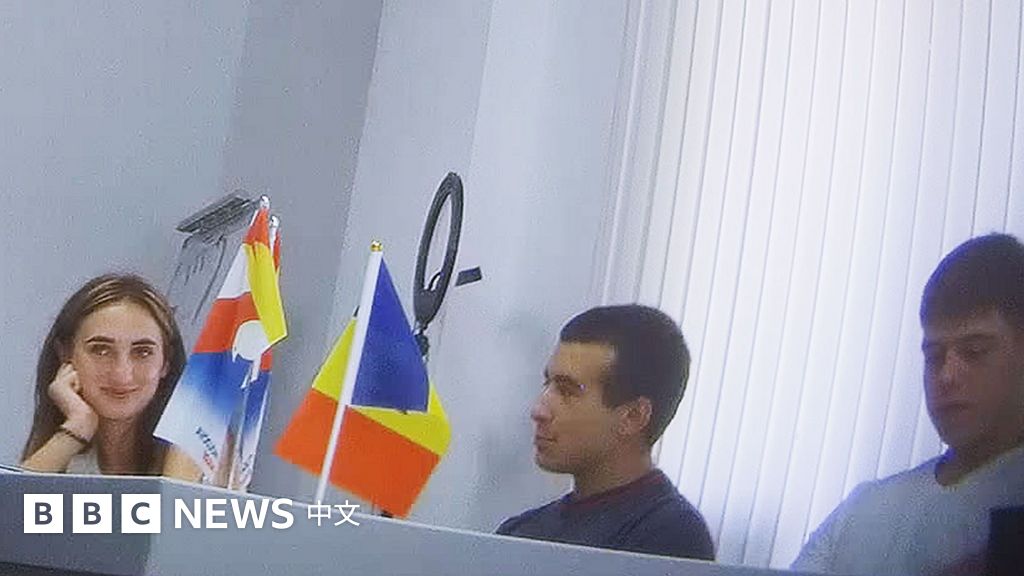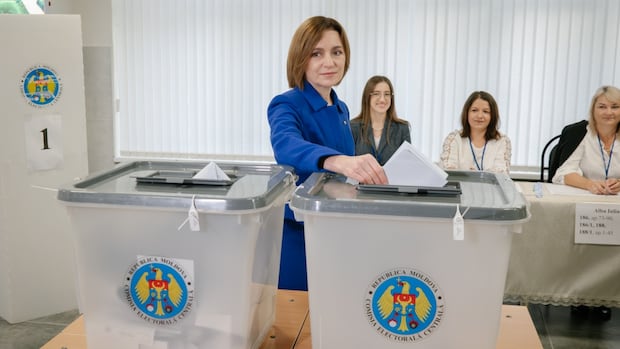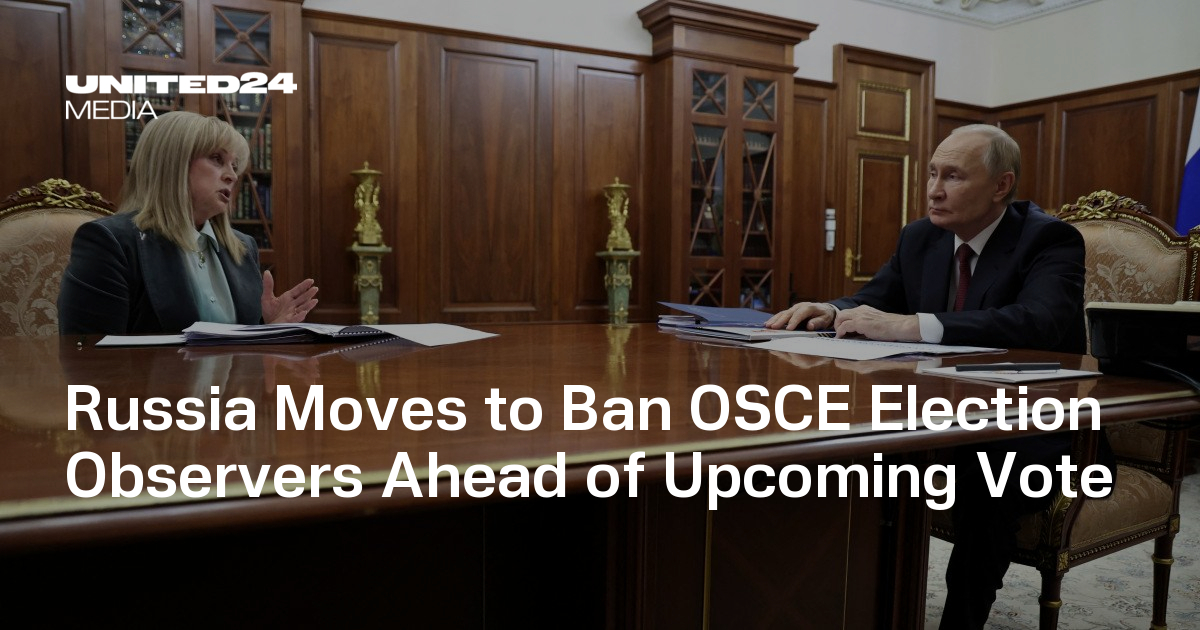Moldova's pro-EU party wins vote mired in claims of Russian interference
17 hours ago Share Save Sarah Rainsford Eastern and Southern Europe correspondent in Chisinau and Paul Kirby Europe digital editor in London Share Save
Anadolu via Getty Images Moldovan President Maia Sandu warned voters their democracy was young and fragile and Russia endangered it
The pro-European party of Moldovan President Maia Sandu has claimed victory and a new majority in parliament in Sunday's elections seen as critical for her country's future path to the EU. Sandu had warned of "massive Russian interference" after voting, saying the future of Moldova, flanked by Ukraine and Romania, was at stake. Igor Grosu, the leader of Sandu's Party of Action and Solidarity (PAS) which secured about 50% of the vote, said Russia had thrown "everything it had" at the election. Opposition leader Igor Dodon had claimed victory even before results came in and called for protests outside parliament in the capital Chisinau on Monday.
However, the win by PAS is emphatic: Monday's protest was tiny and mostly attended by pensioners. And there is no sense at this point that they have any momentum. With 99.9% of the 1.6 million votes counted, PAS had 50.17% of the vote - far ahead of the pro-Russian Patriotic Electoral Bloc on 24.18%, Moldova's central electoral commission said. Turnout was 52%, higher than in recent years. European Commission President Ursula von der Leyen welcomed the result. "You made your choice clear: Europe. Democracy. Freedom," she wrote on X on Monday. Polish Prime Minister Donald Tusk praised Sandu, saying she had "saved democracy" and "stopped Russia in its attempts to take control over the whole region. A good lesson for us all". Ukrainian President Volodymyr Zelensky said in a post on social media: "These elections showed that Russia's destabilising activity loses, while Moldova in Europe wins." In Russia, Kremlin spokesman Dmitry Peskov said: "From what we see and know, we can conclude that hundreds of thousands of Moldovans were deprived of the opportunity to vote in Russia because there were only two polling stations open to them, which was of course insufficient." Recent Moldovan votes have been far closer, but soon after polls closed it became clear that Sandu's party was on course for another majority in the 101-seat parliament. Four years ago, the president's party won 52.8% of the vote, and based on the latest results it is now set to clinch 55 seats. To form a government it will not need to rely on support from other parties, such as the Alternativa bloc or the populist Our Party.
In a measure of the tension surrounding the vote, bomb scares were reported at polling stations in Italy, Romania, Spain and the US. Similar scares were reported in Moldova itself and three people were arrested on suspicion of plotting unrest the day after the vote. Grosu blamed criminal groups backed by Moscow for Sunday's incidents and appealed for "patience and calm" to let the electoral process continue. Moldova also has a pro-Russian breakaway enclave called Transnistria along its border with Ukraine, complete with a Russian military presence. Residents in this sliver of land have Moldovan passports. Many are strongly pro-Moscow and Socialist party leader Igor Dodon said there had been "all sorts of harassment, stopping them from voting".
Sarah Rainsford reports from Moldova's administrative border with Transnistria
Moldovans have been buffeted by Russia's full-scale war in neighbouring Ukraine, but they are also grappling with spiralling prices and high levels of corruption. President Sandu, 53, who won a second term of office last November, warned Moldovans the future of their democracy was in their hands: "Don't play with your vote or you'll lose everything!" Dodon, who is one of Sandu's main rivals, went on national TV as soon as polls closed to claim to his pro-Russian allies in the Patriotic Electoral Bloc had won the election, despite there being no exit polls and before any early results were declared.
Thanking Moldovans for voting "in record numbers", Dodon called on the PAS government to leave power, and for supporters of all opposition parties to take to the streets on Monday to "defend" their vote outside parliament at midday. Asked by the BBC on Monday to comment on his electoral bloc's failure, Dodon said "that's your opinion", claiming that the pro-Russian opposition had won the vote at home, in Moldova. That's only true if you add up all the non PAS votes. The party in fact won a clear majority over all other parties and blocs contesting the election. One of the parties in Dodon's bloc was barred from running two days before the vote because of alleged illicit funding.
In the run-up to the vote, police reported evidence of an unprecedented effort by Russia to spread disinformation and buy votes. Dozens of men were also arrested, accused of travelling to Serbia for firearms training and co-ordinating unrest. A BBC investigation uncovered a network promising to pay participants if they posted pro-Russian propaganda and fake news. Parties sympathetic to Moscow rejected the police claims as fake and a show - created by the government to scare people into supporting them. Russia's embassy in the UK rejected the BBC's allegations, accusing Moldova and its "Western sponsors" of seeking to divert attention from Chisinau's "internal woes". Inside all the polling stations visited by the BBC a small camera had been placed on a tripod overlooking the transparent ballot boxes. Election monitors said they were recording everything, to be checked if there were any reports of violations.
Dan Spatar, who was at one polling station in the capital with his young daughter said he was choosing a European future over a Russian past: "We voted for this four years ago and deserve to continue with it. We see what happens every day in Ukraine and we worry about that." Moldova was awarded EU candidate status in 2022 along with Ukraine, four months after Russia's full-scale invasion of Ukraine. Marina said she was voting "for peace in Moldova, for a better life, for growing our economy" and felt it would be very hard for her country to continue its path to Europe with a pro-Russian government.
Sarah Rainsford/BBC The number of voters from Transnistria was well down on previous years
[SRC] https://www.bbc.com/news/articles/cx2rdlj8ejgo
 Visit the website
Visit the website






